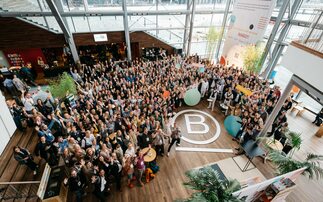Ofi's Andrew Brooks sits down with BusinessGreen to reflect on the food giant's recent sustainability wins and share the firm's priorities for the years ahead
BusinessGreen: What recent green achievement are you most proud of?
Andrew Brooks: At a time when deforestation in the Amazon rainforest reached a record 12-year high in 2020, mainly driven by cattle farming, we're proud to have completed the first phase of our project to restore lost forest in Pará, Brazil. And to have won BusinessGreen's Nature-Based Project of the Year award.
Working closely with our partners, The Nature Conservancy, Mondelēz International, Partnerships for Forests, and Instituto Humanize, our pioneering project is tackling deforestation by promoting cocoa agroforestry - where cocoa is grown alongside native trees and fruits - as a more profitable alternative to cattle farming, giving farmers the tools and support they need to make the transition.
The first phase of the project was completed in June, and it's led to real results. More than 250 smallholder farmers signed a zero-deforestation agreement to bring 14,000 hectares of land under sustainable management, and £210,000 worth of credit applications were approved to help farmers invest in the future of their farms. We're now scaling up the project even further to cover 700 farmers and 48,000 hectares of this vital landscape by 2023.
How has the pandemic impacted ofi's climate and environmental strategy?
Covid-19 made it challenging to deliver some of our on-the-ground sustainability programs. Since access to rural communities wasn't permitted, our teams had to find novel ways to run farmer training and deliver crucial support like medical and food supplies to vulnerable cocoa communities. In Pará, for example, we implemented a remote Technical Assistance Centre via WhatsApp in place of in-person group training and on-field visits.
Despite these hurdles, we've continued making progress and have achieved the first set of milestones under our Cocoa Compass sustainability ambition. We now have child labor monitoring in all our managed sustainability programs and 100% deforestation monitoring in our direct supply chain across nine countries, underpinned by traceability to the individual farm or community. Due to the complex nature of how cocoa is produced, these monitoring systems took years to develop and are a lodestar, shining a light on our supply chain. We can now access information such as how many farmers' children are attending school, or the number of forest trees being planted. This allows us to tailor our interventions and take more targeted action towards our longer-term goals to help farmers earn a living income, eradicate child labor and protect the natural world.
What is the biggest net zero challenge facing your business going forward?
Cutting emissions from cocoa farming and cocoa processing will be a significant challenge. It's why for the first time this year, we published natural capital costs for our cocoa business. This is a way for companies to quantify the true environmental impact of their operations and understand where to channel further investment.
In 2019/20, we achieved a decrease in natural capital costs across our operations. Although we still have a way to go to reach our goal of a 30% reduction of natural capital costs in our direct cocoa supply chain by 2030, we're making progress and continually refining our approach. For example, in our cocoa processing facilities, we switched to green electricity in 2 some and installed boilers that run on waste cocoa shells in others. At the farm level, the figures show the greatest reductions were driven by training cocoa farmers in techniques like pruning, planting shade trees, efficient use of fertilizers, and composting crop residues, which together help restore biodiversity and offset carbon costs.
What issue facing the green economy do you think is too often overlooked?
When it comes to deforestation, there is often a big focus on prevention or planting trees as a solution. But we also need to get a handle on the root cause of the problem - farmer poverty. To break the cycle, we need to introduce the right economic incentives to preserve and protect natural resources and secure a sustainable future for food supply chains. That's why our Cocoa Compass strategy sets out living income targets for farmers in our cocoa supplier network to close the poverty gap and ensure cocoa remains an attractive profession for future generations.
Our project in Pará, Brazil, has been successful in giving farmers the tools and economic support they need to be agents of positive change. Farmers are paid a premium on their cocoa in exchange for zero deforestation and restoration commitments. We're also providing advice on financial management and access to subsidized rural credit lines, two common bottlenecks to farmers switching to sustainable production.
What are your hopes for the green economy, and your company's place within it?
There are big challenges facing the green economy that can't be solved alone. Collaboration is key, and we've seen first-hand the positive outcomes that joint initiatives can achieve. Take the Cocoa & Forests Initiative (CFI), which engages stakeholders from across the cocoa and chocolate industry around an agreed framework to help tackle deforestation in the two biggest cocoa-producing countries, Côte d'Ivoire and Ghana. The data shows initiatives like these are starting to have an impact - according to the UN Convention on Biological Diversity, the rate of forest loss from 2018 to 2019 in Côte d'Ivoire and Ghana halved.
We need to build on these successes with further multi-stakeholder action. Proposed environmental due diligence laws in the EU would also help create a level playing field across the supply chain and strengthen the industry's efforts to tackle issues ranging from deforestation and carbon emissions to farmer poverty and child labor. That's why we're part of the COP26 FACT (Forest, Agriculture and Commodity Trade) Dialogue, actively working with peers and partners to share best practices on how to turn the tide on commodity-driven deforestation.
ofi was a winner at the BusinessGreen Leaders Awards.






